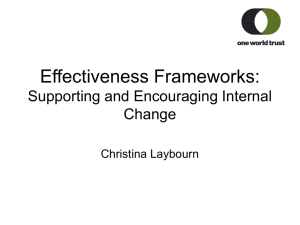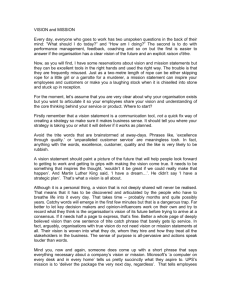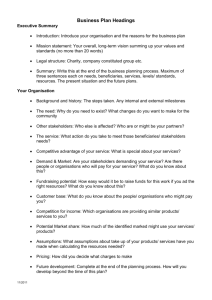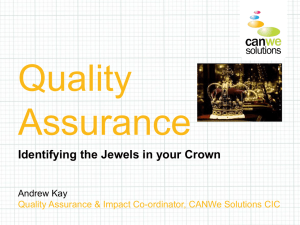DFI Led Quality Initiatives in the Disability sector
advertisement
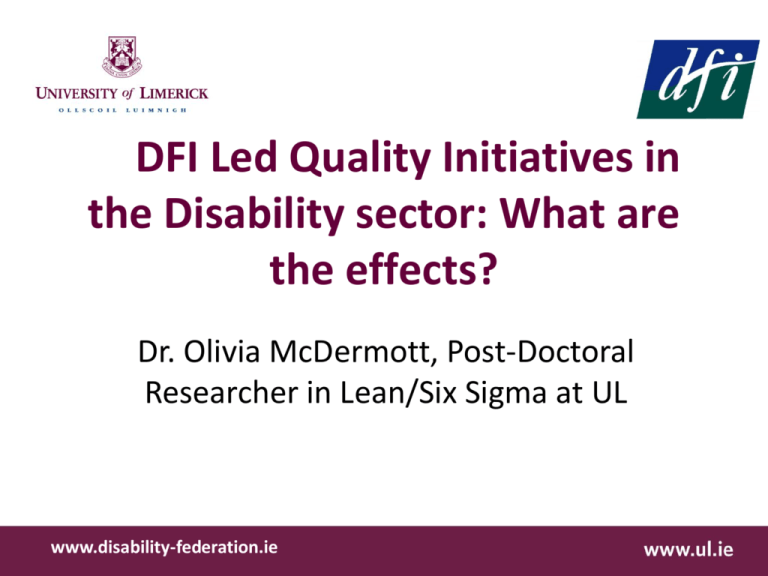
DFI Led Quality Initiatives in the Disability sector: What are the effects? Dr. Olivia McDermott, Post-Doctoral Researcher in Lean/Six Sigma at UL www.disability-federation.ie Aims 1. To determine if DFI Quality Initiatives are having an impact: i) within member organisations ii) to Service Users 2. To identify next steps on the Quality Initiative journey www.disability-federation.ie Methodology • 3 students carried out the research as part of the Specialist Diploma in Lean Systems (UL) • The 3 students were based in Wicklow, Mayo and Limerick. To facilitate that, the organisations and Support Officers nominated to take part in the research were chosen primarily on proximity to the students • 30 DFI member Organisations/participants were nominated to take part in the research www.disability-federation.ie Methodology (continued) • The organisations/participants were proposed by DFI Support Officers, based on the following criteria: - Type of Quality Initiative adopted - Geographical location - Size of organisation - Type of service provided • Each research student was assigned at least one organisation that was: - Local - Regional - National www.disability-federation.ie No. of participants nominated No. of participants who took part in research No. of organisations using this initiative* Organisation Healthcheck 6 3 40 PQASSO 9 8 25 Introduction to TQM 6 4 38 Specialist Diploma 3 3 3 Placebo 3 3 21 Support Officer 3 3 n/a www.disability-federation.ie How research was conducted: www.disability-federation.ie Designed a Voice of the Customer (VOC) process to gather data Interviewed organisations at various stages of Quality Journey Reviewed findings Recommended changes Voice of the Customer (VOC) process: In order to have a comprehensive VOC system, the following elements are required: • A process for engaging with, and listening to, the customer • Mechanisms for the effective collection of VOC data • Meaningful analysis and reporting of data to understand customer issues and opportunities • Organisational commitment to address VOC issues and deliver added value to current and potential customers www.disability-federation.ie VOC process: 2 formats 1. Survey Questions Used for 10 organisations/participants: 1 Organisation Healthcheck organisation 8 PQASSO organisations 1 Specialist Diploma participant www.disability-federation.ie VOC process: 2 formats (continued) 2. Open interviews: Used in 22 organisations/participants: 3 Organisation Healthcheck organisations 7 PQASSO organisations 4 “Introduction to Total Quality Management (TQM)” participants 2 “Specialist Diploma in Lean Systems” participants 3 Placebo organisations 3 Support Officers www.disability-federation.ie Findings of Survey Questions Across all the DFI Quality Initiatives (n = 10): 5.0 4.0 4.5 4.2 4.0 3.0 2.0 1.0 0.0 4.0 4.0 3.3 Strongly Agree = 5 Agree = 4 Neutral = 3 Disagree = 2 Strongly Disagree = 1 Findings from Interviews on the Organisation Healthcheck (OHC) process • Data was included from the 3 OHC interviewees and 3 Support Officers • Two-thirds of interviewees (4 out 6) found the OHC to be useful as a reflective process It showed our strengths and weaknesses www.disability-federation.ie It gives a baseline to the organisation’s existing management and operating systems It highlights the organisations opinion of where they think they are Findings from Interviews on the OHC process The primary challenges were found to be: • Fear/resistance to the OHC process (3 interviewees) • No process to assess the impact on the service user & organisation (3 interviewees) • Sustaining the improvements brought about by the Healthcheck (2 interviewees) There is a fear of what it will expose www.disability-federation.ie If they stop after the Healthcheck, the changes may not be sustained The key challenge is to get buy in from the Board of Management Findings from Open Interviews on the PQASSO process • 5 of the 7 participants believed that as a Quality Management System (QMS), the PQASSO process was relevant to their organisation. • 2 participants commented that they would like the process to be adapted to better suit the Irish sector. The sources of evidence are important because they make us think about the process www.disability-federation.ie Would be beneficial to have an ‘Irish’ version of PQASSO, where PQASSO headings could be tailored to meet HIQA requirements Findings from Open Interviews on the PQASSO process 5 participants stated that they would be unable to implement PQASSO without DFI Support. 2 participants believed that without the support from DFI, the process would be slower/less accurate. Would not have had buy in without DFI www.disability-federation.ie Without the support of the DFI then implementation of PQASSO would have happened at a much slower rate It could be done but not as easily Findings from Open Interviews on the PQASSO process • All participants were happy with the support they received from DFI on the PQASSO Core Team. • 5 participants commented that they found the PQASSO Champions Network beneficial, with 2 of these stating that they would gain further benefit from more meetings. Can draw on experience from other organisations His (DFI Mentor) attention to detail is very important especially when working through supporting evidence www.disability-federation.ie PQASSO Champion Network beneficial with the sharing of information and experiences Findings from Interviews on the PQASSO process 5 participants found that PQASSO was having a positive impact within their organisation with 2 people stating that there had been no measurable impact to date. The main areas of impact were: - Better Governance (5 partipants) - Increased involvement of service user in design and delivery of services (5 participants) - Confidence to challenge existing processes (3 participants) - More strategic planning (3 participants) - Better record keeping (2 partipants) It has brought about greater accountability and responsibility www.disability-federation.ie The organisation is more user led Feedback has improved and teamwork is more evident Findings from Open Interviews on the PQASSO process 5 participants stated that changes had been made in their organisation as a direct result of the PQASSO process 1 person stating changes proposed and awaiting implementation. 1 person stating no changes had been made as yet There is more order and structure www.disability-federation.ie Employee standards have been put in place Board roles and job descriptions are now established Findings from Open Interviews on the Introduction to Total Quality Management (TQM) process All Participants (n=4) in the TQM course found it of value to them. Of these, 1 participant reported changes within their organisation as a direct result of the course. Training enabled us to better identify scope for improvement www.disability-federation.ie Found the course relevant and opened up new ideas and areas Findings from Open Interviewees of the UL Specialist Diploma All participants (n=3) in the UL Specialist Diploma found that it enabled them to make improvements within their organisation. My studies have enabled me to make several improvements within my organisation www.disability-federation.ie The specialist Diploma has delivered on efficiency and assisted the organisation in its quest for continuous improvement Findings from Placebo Interviews The organisations involved in the placebo interviews (n=3) had been offered the opportunity to take part in the DFI Quality Initiatives. The reasons given for not taking part were as follows: • Lack of understanding of process (2 participants) • Fear of what it would involve (1 participant) 2 organisations believed there was a desire to improve, but they did not know how to address this. They could improve across all areas if they had assistance www.disability-federation.ie There is fear of what is involved in introducing a quality system Research Limitations Not all targeted organisations took part in the research (24 out of 30) The results are for a limited sample size: - 3 organisations who had completed the OHC (out of a total of 40) - 8 organisations who had completed PQASSO (out of a total of 25) - 4 people who had completed the Introduction to TQM course (out of a total of 38) - 3 people who had completed the Specialist Diploma (out of a total of 3 - 3 Support Officers www.disability-federation.ie Conclusions The results from the VOC process demonstrated that participants believed the DFI Quality Initiatives were having a positive impact within their organisation. The findings of the survey questions indicated that the interviewees believed that the DFI quality initiatives had a positive impact on the service-user. www.disability-federation.ie Conclusions:(Organisation Healthcheck) The Organisation Healthcheck provides a baseline to enable the measure of progress in the future. The Organisation Healthcheck would appear to raise awareness of how well an organisation was functioning, but wouldn’t necessarily provide the momentum for continuous improvement steps. www.disability-federation.ie Conclusions (PQASSO) PQASSO appeared to show considerable benefit to those involved, not only raising awareness about issues within their organisation, but also putting in systems to ensure they are addressed over the long term. The aim to have service user representation on the PQASSO core team is a unique approach in a QMS and one that should ensure that changes affecting the service user are made with the input of the service user. www.disability-federation.ie Conclusions :(Introduction to TQM) The 5 day “Introduction to Total Quality Management” course would appear to be of significant value, however, those that had completed the course were often not getting the opportunity to apply the tools they had learned. www.disability-federation.ie Conclusions:(UL Specialist Diploma) The UL Specialist Diploma would appear to be of great benefit as the 3 participants interviewed had implemented improvements which would not only benefit the organisation but also the service user – the ultimate aim of each organisation. The roles of the participants within their organisation may have contributed in this regard: - 2 were managers - 1 was a board member www.disability-federation.ie Conclusions: (Summary) Overall, it can be concluded that the DFI Quality Initiatives are having a positive impact on the organisations where they have been introduced, but that more needs to be done to ensure that the service user is feeling the benefit of these processes. This could be facilitated by adopting a whole of organisation approach, paying particular attention to the needs of service users. PQASSO QMS is particularly useful in this regard as it requires that service user/service user advocates, are a member of the PQASSO Core Team. www.disability-federation.ie Recommendations for: Organisations To ensure that any Quality Initiative is successful, all stakeholders should be aware of, and kept up to date on the process. Ensure that supports available e.g. DFI PQASSO Mentor/Support Officers/PQASSO Champion Network, are used to share knowledge and resources. Employing a VOC process within each organisation would ensure that changes impacting the service user are of value to the service user. Where a DFI Quality Initiative has been introduced but is not being integrated as planned, follow up with DFI for advice. www.disability-federation.ie Recommendations for: DFI Develop means of addressing fear associated with introducing the Quality Initiatives. Strengthen process of follow up with organisations that: a) are hesitant about introducing a Quality Initiative b) have undertaken the OHC but not proceeded with PQASSO c) have begun implementation of PQASSO, but stalled along the journey www.disability-federation.ie Recommendations for: DFI (continued) In order to make sure PQASSO is tailored to the Irish disability sector, adapt the training course given to include Irish examples (** now policy for 2014). Introduce more frequent PQASSO Champion Network meetings (** increased to 3 per annum from July 2013). Expand present networking between organisations, and develop clusters (location/organisation based). Continue the DFI/UL collaborative partnership to further develop quality supports for the sector. www.disability-federation.ie Thank you for listening www.disability-federation.ie
